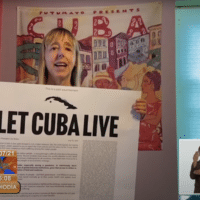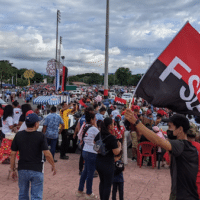-
Repressing radical protest, tolerating reactionary violence: The U.S. double standard in historical context
The following essay examines the different reactions to radical and reactionary protest, and situates them in a broader historical context. In doing so, we find that the capitalist state will tolerate reactionary violence to a large extent since it represents no threat to capitalist property relations. In contrast, when faced with radical (and particularly socialist) movements capitalist states engage in much more severe repression.
-
Craig Murray’s jailing is the latest move in a battle to snuff out independent journalism
He becomes the first person ever to be imprisoned on the obscure and vaguely defined charge of “jigsaw identification”.
-
Moving Beyond Capitalist Agriculture: Could Agroecology Prevent Further Pandemics?
The current complex of COVID-induced crises fits hand-in-glove with the system’s “normal” operation. Stability has been the delusional realm of a small sliver of the Global North, awash in post-World War Two imperialism and the repeated reinvention (and re-imposition) of various plantation systems of cheap and racialized labor.
-
Daniel Hale sentenced to 45 months for exposing U.S. drones program and kill list
Hale released a total of 17 documents, of which 11 were marked secret and top-secret. One exposed that during one five-month period of the operation, civilian casualties constituted over 90% of the victims of drone strikes.
-
Creating a democratically run economy: lessons from World War II price control struggles*
Many activists in the United States are working to build a movement for a Green New Deal transformation of the economy. Not surprisingly, a growing number look to the World War II conversion of the U.S. economy from civilian to military production for inspiration and policy ideas.
-
Neo-Liberalism and the extreme Right
Georgi Dimitrov, president of the Communist International, had, at its Seventh Congress, characterised a fascist State as the “open terrorist dictatorship of the most reactionary section of finance capital”
-
Let Cuba Live—The movement standing up to Biden’s maximum pressure campaign
On July 22, U.S. President Joe Biden and his Vice President Kamala Harris released a “fact sheet” on U.S. “measures” against Cuba. The release from the White House said that Cuba was a “top priority for the Biden-Harris administration.”
-
People working a minimum wage job can’t afford rent anywhere in the U.S.
Over 40% of Black and Latinx households pay more than 30% of their income on rent, compared with 25% of white households.
-
China takes tough approach to tame tutoring schools
The new set of rules aim to better monitor the education market, which has been blamed for increasingly unfair competition among students.
-
Nicaragua’s Sandinistas battle ‘diabolical’ U.S. empire and poverty on 42nd anniversary of revolution
The Grayzone reports from Nicaragua on the 42nd anniversary of the Sandinista revolution. Nicaraguans discuss their improved quality of life, President Ortega condemns the dictatorial U.S. “empire that wants to dominate all countries,” and Vice President Murillo declares poverty an imperialist “crime against humanity.”
-
People’s lawyer P. A. Sebastian and the Socialist Project
Sebastian, in his writings in The Fight to Win Rights, is direct, and honest, unafraid to state unpalatable facts. Blunt and matter-of-fact, his words seem to be deliberately chosen to appeal to the conscience of people, his mode of expression reflecting his commitment to justice and the truth.
-
DOCUMENT: James Weldon Johnson, Self-determining Haiti, 1920
Plan follows precedent of 1970s state-sponsored assassination campaign targeting leftists.
-
Washington beats the drum of regime change, but Cuba responds to its own revolutionary rhythm: The Twenty-Ninth Newsletter (2021)
Four days after Moïse’s assassination, Cuba experienced a set of protests from people expressing their frustration with shortages of goods and a recent spike of COVID-19 infections.
-
Saab case shows Western media’s casual acceptance of U.S. atrocities
Imagine being imprisoned for nonviolently attempting to prevent a heinous crime. That sums up the absurdity of Saab’s predicament–and Western media’s coverage of it.
-
Amílcar Cabral: Liberator, theorist, and educator
Amílcar Lopes da Costa Cabral was born September 12, 1924 in Bafatá, Guinea-Bissau, one of Portugal’s African colonies. On January 20, 1973–48 years ago today–Cabral was murdered by fascist Portuguese assassins just months before the national liberation movement in which he played a central role won the independence of Guinea-Bissau.
-
Former British Ambassador to Damascus says OPCW mere ‘puppet’ of West against Syria
Comments by the former British ambassador to Syria came hours after the chairwoman of the Syrian mission to the OPCW said the U.S. and its allies had lowered the status of the international watchdog, and turned it into a political tool to level baseless accusations against Damascus and exert pressure on it.
-
Behold: the fallacy of “techo-inevitabilism”
Director Werner Herzog’s documentary ‘Lo and Behold: Reveries of the Connected World’ (2016) begins with “Internet pioneer” Leonard Kleinrock, who welcomes us into the, yes, actual laboratory where it was “born”! To Wagnerian strains in the soundtrack, Kleinrock complacently calls the place “a holy shrine”–quite a revealing phrase for this acolyte of possibly the last of the false religions.
-
The bay of Tweets: documents point to U.S. hand in Cuba protests
The U.S. government can cause economic misery for the Cuban people, but it cannot, it appears, convince them to overthrow their government.
-
Pretending not to see brazen lies: the rule of law and nuclear madness
The latest brazen lie is the “rule of law” upheld by U.S. President Joe Biden at the G7 and NATO summits, especially lies about lawlessness surrounding nuclear weapons.
-
Maintenance of denial
We are witnessing today the final days of a militaristic empire, the rapid descent of an obsolete failed United States. There is nothing unique about America. Empires rise and empires fall throughout time memorial. It is empirically calculated that the average civilization only lasts 340 years.




















